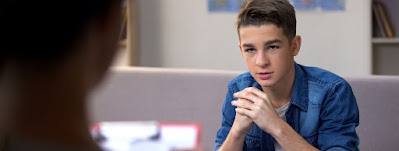One of the main roles of a youth worker is to create a safe environment for youth to learn and feel they can share their thoughts and feelings. Creating this environment is based on research in positive youth development. I, along with colleagues from the Center for Youth Development, authored a discussion guide, Creating space for dialogue on difficult and important topics with youth, in response to many of the events that occurred in our country in the past year.
In my further research into the topic of creating space for dialogue, I noticed there was similar advice given to “check in with yourself” first before having a conversation with youth on a difficult topic. As youth workers, we have to make time to process our own feelings and become aware of the way our own identities and experiences shape the perspectives we hold before we can support young people to do so.
Self-reflection is important preparation for facilitating conversations about troubling events that occur in our community, state, country or the world. Facing History and Ourselves says we have to be aware of our own strongly held beliefs, political positions, emotional responses and biases. We need to be thoughtful about how they influence what we say and do when the “headlines” enter our youth program.
According to Facing History and Ourselves and Unconditionallearning.org there are actions youth workers can take when current events take over our plans:
- Disconnect from the news and social media and take a moment to journal or move your body. Take time to slow down and reflect. How are you feeling? What emotions do you have? What questions are you grappling with? What perspectives do you have on this event?
- Reach out to your professional colleagues and personal networks. Discuss your thoughts and how the youth in your program might be responding. Coordinate a plan of action of support and learning for the youth
- Don’t be afraid to let others know you need support around your own emotional response.
Do you have a practice of reflecting and becoming aware of your emotions? How does this practice make you a better youth worker?
You are welcome to comment on this blog post. We encourage civil discourse, including spirited disagreement. We will delete comments that contain profanity, pornography or hate speech--any remarks that attack or demean people because of their sex, race, ethnic group, etc.--as well as spam.
-- Karyn Santl, Extension educator
You are welcome to comment on this blog post. We encourage civil discourse, including spirited disagreement. We will delete comments that contain profanity, pornography or hate speech--any remarks that attack or demean people because of their sex, race, ethnic group, etc.--as well as spam.

Thanks, Karyn, for the blog article and the resource. So important to check in with ourselves before checking in with youth! I have done all three of those actions and have found each of them to be very effective. Thanks again for the post.
ReplyDeleteThanks Jess! Yes, its important for us to reflect and check in with colleagues.
DeleteExcellent reminders, Karyn. When training adults on SEL we stress starting with ourselves. This may include examining our own sociocultural identities and biases, strengthening our ability to empathize and take on perspectives of those who are different from ourselves, practicing skills to help build relationships and rapport, and assessing how our actions impact equitable outcomes. Your practical tips are good strategies to equip ourselves to create space for dialogue with young people.
ReplyDeleteThanks Kate! For me it was an "aha" when I examined my own sociocultural identity and realized that not everyone responds or thinks the same way I do. Seems like a simple concept, but a lot of times we don't think about how our culture and environment impacts us. We all have different lived experiences.
DeleteOne way I practice this in a small way is to pause and take a deep breath before responding in a hard conversation. It's more difficult than it seems! The instinct to respond quickly is strong, but taking that moment allows for us to see things from another side, not just our singular perspective.
ReplyDeleteYes Sarah! Even a simple breath can help us gain perspective and respond in a more positive light. And this can be hard in a difficult conversation. Thanks for sharing.
DeleteGreat reminder for self reflection this time of year. I am always reminded of the saying "You can't pour from an empty cup." Inventorying self emotions can be a such a good grounding exercise.
ReplyDeleteThat is a great reminder & quote to remember! Thanks for sharing.
Delete